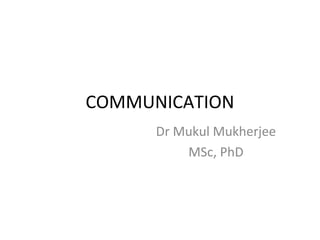Communication
- 2. COMMUNICATION AXIOMS âĒ COMMUNICATION IS NOT WHAT IS SAID BUT WHAT IS HEARD BY THE RECIEVER âĒ COMMUNICATION IS A JOINT EFFORT AT REMOVING SNAGS AND SMOOTHENING OPERATIONS âĒ HEARING BUT NOT REGISTERING IS NOT COMMUNICATION
- 3. COMMUNICATION- TWO WAY PROCESS âĒ HELPS IN CLARIFICATIONS OF DOUBTS, CONFUSIONS AND MISCONCEPTIONS âĒ BOTH PARTIES UNDERSTAND EACH OTHER âĒ RECEIVING AND GIVING OF âFEEDBACKâ âĒ INDICATING THE DEGREE OF RESPECT BETWEEN THE TWO PARTIES
- 4. COMMUNICATION TAKES PLACE WHEN A sender SELECTS A CERTAIN message AND GIVES IT A SPECIAL treatment FOR TRANSMISSION OVER A SELECTED channel TO A reciever WHO INTERPRETS THE MESSAGE BEFORE desired action IS TAKEN UP.
- 5. NON VERBAL COMMUNICATION âĒ Using Our Bodies-gestures, Posture, Nod, Facial Expression & Eye Movement âĒ Using Sounds- Laugh, Yawn, Scream Groan, Whisper âĒ Touch- Pat, Push, Caress âĒ Silence- Shock, Disapproval, Hurt, Joy, Togetherness âĒ Distance- Close Sitting, Standing Far Apart, Sitting On Higher Seat âĒ Dress
- 6. BARRIERS TO EFFECTIVE COMMUNICATION âĒ AT PERSONAL LEVEL 1. Our Values, Opinions, Prejudices And Attitudes 2. Tendency To Speak Before Thinking 3. Stereotyping /Generalisation 4. Preconceptions 5. Lack Of Trust
- 7. BARRIERS TO EFFECTIVE COMMUNICATION- NOISE âĒ SITUATIONAL 1. Physical Well-being Of The Sender 2. Differences In Backgrounds & Context Between The Parties 3. Differences In Languages 4. Physical Factors- Atmosphere And Environs
- 8. EFFECTIVE LISTENING âĒ Concentrate On Hearing âĒ Listen With Open Mind âĒ Pay Attention-go Beyond Words âĒ Do Not Predict, Donât Jump To Conclusions âĒ Do Not Pretend To Understand âĒ Do Not Interfere, Argue, Or Become Defensive âĒ To Ensure Listening, From Time To Time Must Restate, Repeat, And Summarise








